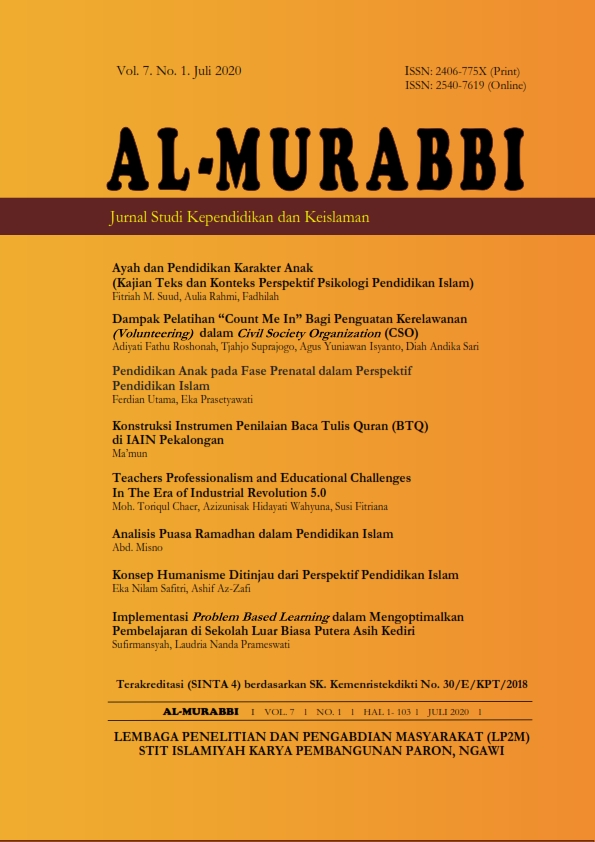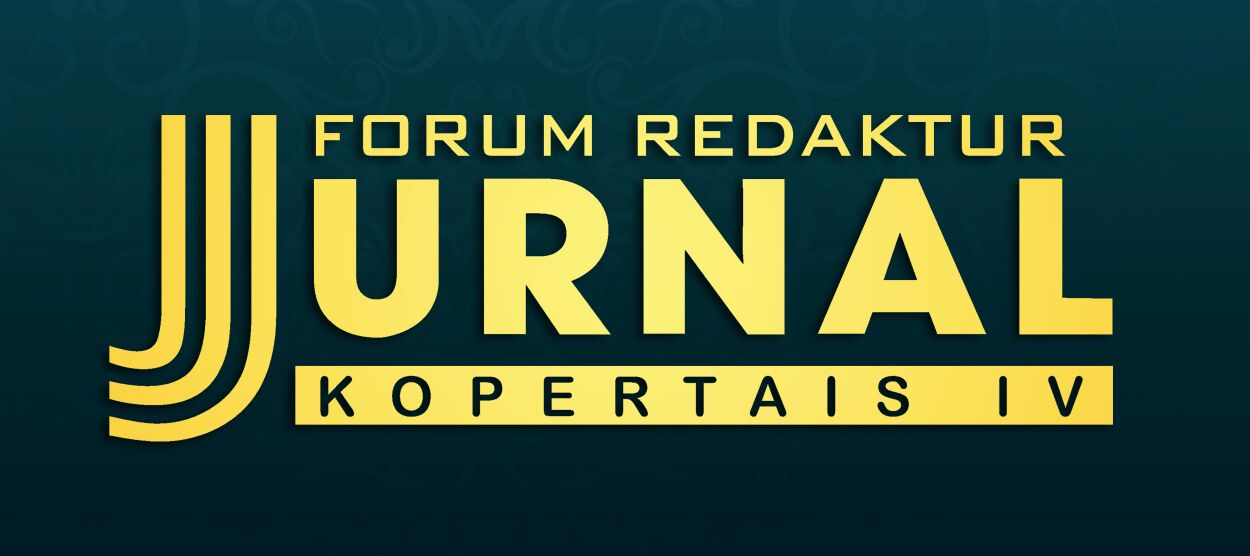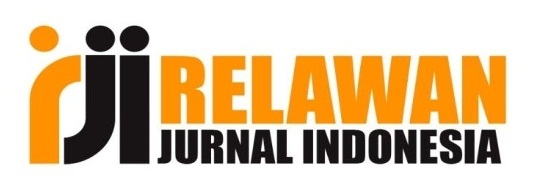Ayah dan Pendidikan Karakter Anak (Kajian Teks dan Konteks Perspektif Psikologi Pendidikan Islam)
(Kajian Teks dan Konteks Perspektif Psikologi Pendidikan Islam)
Abstract
The quality and quantity of mother and child attachment have often been discussing. Nevertheless, how the quality and quantity of the relationship between father and son, especially in shaping the child's personality is still rarely found. In the life of a child, sometimes role, the father is not felt because his figure is busy outside the home. Also provides an assumption that the father does not influence raising and educating children. The context of Islamic education in the family, the figure of the father, is the spiritual basis that underlies the role of parents in educating their children. A person's character formed early on. In this case, the role of the family is indeed very influential. The education of the father in the family is critical and is a fundamental pillar of character building for a child. From a child's father learns, hardened, brave, responsible, and easy to get along with the outside world. This study aims to present the role of fathers in shaping the character of children in terms of the study of texts and contexts through the field of psychology in Islamic education. The contextual study presents the latest research that proves the influence of the father in many ways for children and terms of the text of this study will present the primary sources of guidance for Muslim life, namely the Qur'an and the Hadith. So the implications given are not only normative but grounded to be able to broaden understanding and add new constructs for the implementation of the father and son relationship.
Downloads
References
Adnan Hasan Salih Baharits, Tanggung Jawab Ayah terhadap Anak Laki-laki, (Jakarta: Gema Insani Press, 1996), 29
April Litchford, Mateja R. Savoie Roskos, Heidi Wengreen, Influence of fathers on the feeding practices and behaviors of children: A systematic review, Appetite, Volume 147, 2020, 104558, ISSN 0195-6663, https://doi.org/10.1016/j.appet.2019.104558.
B. Barker, J.E. Iles, P.G. RamchandaniFathers, fathering and child psychopathology Curr. Opin. Psychol., 15 (2017), pp. 87-92
Basel El-Khodary, Muthanna Samara, The mediating role of trait emotional intelligence, prosocial behaviour, parental support and parental psychological control on the relationship between war trauma, and PTSD and depression, Journal of Research in Personality,Volume 81, 2019,
Charles Opondo, Maggie Redshaw, Maria A. Quigley, Association between father involvement and attitudes in early child-rearing and depressive symptoms in the pre-adolescent period in a UK birth cohort, Journal of Affective Disorders, Volume 221, 2017, Pages 115-122, ISSN 0165-0327, https://doi.org/10.1016/j.jad.2017.06.010.
Darwis, Djamaluddin, 2010. Dinamika Pendidikan Islam: Sejarah Ragam dan Kelembagaan. Rasail- Semarang.
Gaffar, Mohammad Fakry. 2010. Pendidikan Karakter Berbasis Islam. (Disampaikan pada Workshop Pendidikan Karakter Berbasis Agama, 08-10 April 2010 di Yogyakarta)
Hamdani, Hamid dkk, 2013. Pendidikan Karakter Perspektif Islam, Pustaka Setia, Bandung.
Harmaini, dkk. 2014. Peran Ayah Dalam Mendidik Anak, Jurnal Psikologi, Volume 10 Nomor 2, Desember 2014, Center for Indigenous Psychology, Riau.
Harmaini, H., Shofiah, V., & Yulianti, A. (2015). Peran ayah dalam mendidik anak. Jurnal psikologi, 10(2), 80-85.
Hidayati, F., Kaloeti, D. V. S., & Karyono, K. (2011). Peran ayah dalam pengasuhan anak. Jurnal Psikologi, 9(1).
Holly A. Harris, Elena Jansen, Tony Rossi, ‘It's not worth the fight’: Fathers' perceptions of family mealtime interactions, feeding practices and child eating behaviours, Appetite, Volume 150, 2020,104642, ISSN 0195-6663, https://doi.org/10.1016/j.appet.2020.104642.
ISSN 0747-5632, https://doi.org/10.1016/j.chb.2019.01.031.
Jaimie L. O'Gara, Anao Zhang, Yolanda Padilla, Chun Liu, Kaipeng Wang, Father-youth closeness and adolescent self-rated health: The mediating role of mental health, Children and Youth Services Review, Volume 104, 2019, 104386, ISSN 0190-7409, https://doi.org/10.1016/j.childyouth.2019.104386.
Ji-Hye Hwang, Sun-Mi Chae, Experiences of fathers of young children with severe congenital heart efects in Korea: A qualitative descriptive study, Journal of Pediatric Nursing, 2020, ISSN 0882-5963, https://doi.org/10.1016/j.pedn.2020.02.040.
Karen Bluth, Jinyoung Park, Christine Lathren, Is parents’ education level associated with adolescent self-compassion?, EXPLORE, 2020, ISSN 1550-8307, https://doi.org/10.1016/j.explore.2020.02.003.
Keusuma, dkk, 2011. pendidikan karakter kajian teori dan praktek di sekolah, PT Remaja Rosdakarya- Bandung.
Masy’ari, Anwar. 1991. Membentuk Pribadi Muslim, Alma’arif- Bandung.
Maternal and paternal personality profiles of adolescent suicide attempters, Psychiatry Research, Volume 248, 2017, Pages 77-82, ISSN 0165-1781, https://doi.org/10.1016/j.psychres.2016.12.017.
Megawangi, Ratna. 2004. Pendidikan Karakter, Solusi Yang Tepat untuk Membangun Bangsa. Bogor: Indonesia Heritage Foundation.
N.J. Cabrera, H.E. Fitzgerald, R.H. Bradley, L. RoggmanThe ecology of father-child elationships: an expanded model J. Fam. Theory Rev., 6 (4) (2014), pp. 336-354
Nurullah Bolat, Tayyib Kadak, Kayi Eliacik, Enis Sargin, Secil Incekas, Hatice Gunes,
Pages 246-256, ISSN 0092-6566, https://doi.org/10.1016/j.jrp.2019.06.004.
Pamella H. Oliver, Diana Wright Guerin, Jacqueline K. Coffman, Big five parental personality traits, parenting behaviors, and adolescent behavior problems: A mediation model, Personality and Individual Differences, Volume 47, Issue 6, 2009, Pages 631-636, ISSN 0191-8869, https://doi.org/10.1016/j.paid.2009.05.026.
Prasetyo, Nana, 2010. Membangun Karater Anak Usia Dini, Direktorat Pembinaan Pendidikan Anak Usia DiniDirektorat Jenderal Pendidikan Anak Usia Dini Nonformal dan Informal Kementerian Pendidikan Nasional.
Qiana R. Cryer-Coupet, Marquitta S. Dorsey, Brianna P. Lemmons, Elan C. Hope, Examining multiple dimensions of father involvement as predictors of risk-taking intentions among black adolescent females, Children and Youth Services Review, Volume 108, 2020, 104604, ISSN 0190-7409, https://doi.org/10.1016/j.childyouth.2019.104604.
R. Kok, P. Prinzie, M.J. Bakermans-Kranenburg, F.C. Verhulst, T. White, H. Tiemeier, et al.Socialization of prosocial behavior: gender differences in the mediating role of child brain volume Child Neuropsychol., 18 (10) (2018), pp. 1-11
Richard C. Halverson (2002), “What G o d Expects from Fathers†dalam Parents & Children.
Susan Yoon, Fei Pei, Xiafei Wang, Dalhee Yoon, Guijin Lee, Karla Shockley McCarthy, Sarah J. Schoppe-Sullivan, Vulnerability or resilience to early substance use among adolescents at risk: The roles of maltreatment and father involvement, Child Abuse & Neglect, Volume 86, 2018, Pages 206-216, ISSN 0145-2134, https://doi.org/10.1016/j.chiabu.2018.09.020.
Tafsir, Ahmad, 2010. Ilmu Pendidikan Dalam Perspektif Islam, PT Remaja Rosdakarya- Bandung.
V. Sethna, E. Perry, J. Domoney, J. Iles, L. Psychogiou, N.E.L. Rowbotham, et al.Father-child interactions at 3 months and 24 months: contributions to children’s cognitive development at 24 months Infant Ment. Health J., 38 (3) (2017), pp. 378-390
Vaheshta Sethna, Jasmine Siew, Inês Pote, Siying Wang, Maria Gudbrandsen, Charlotte Lee, Emily Perry, Kerrie P.H. Adams, Clare Watson, Johanna Kangas, Vladimira Stoencheva, Eileen Daly, Maria Kuklisova-Murgasova, Steven C.R. Williams, Michael C. Craig, Declan G.M. Murphy, Grainne M. McAlonan,Father-infant interactions and infant regional brain volumes: A cross-sectional MRI study, Developmental Cognitive Neuroscience, Volume 40, 2019, 100721,ISSN 1878-9293, https://doi.org/10.1016/j.dcn.2019.100721
Xingchao Wang, Jiping Yang, Pengcheng Wang, Li Lei, Childhood maltreatment, moral disengagement, and adolescents' cyberbullying perpetration: Fathers' and mothers' moral disengagement as moderators, Computers in Human Behavior, Volume 95, 2019, Pages 48-57,
Copyright (c) 2020 AL-MURABBI: Jurnal Studi Kependidikan dan Keislaman

This work is licensed under a Creative Commons Attribution-ShareAlike 4.0 International License.











